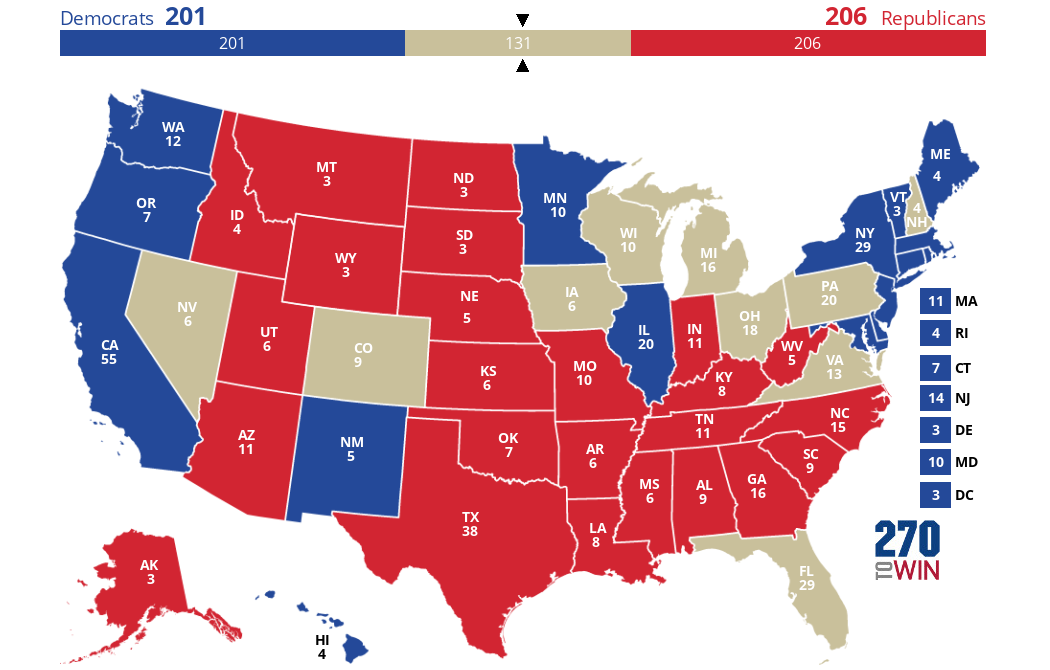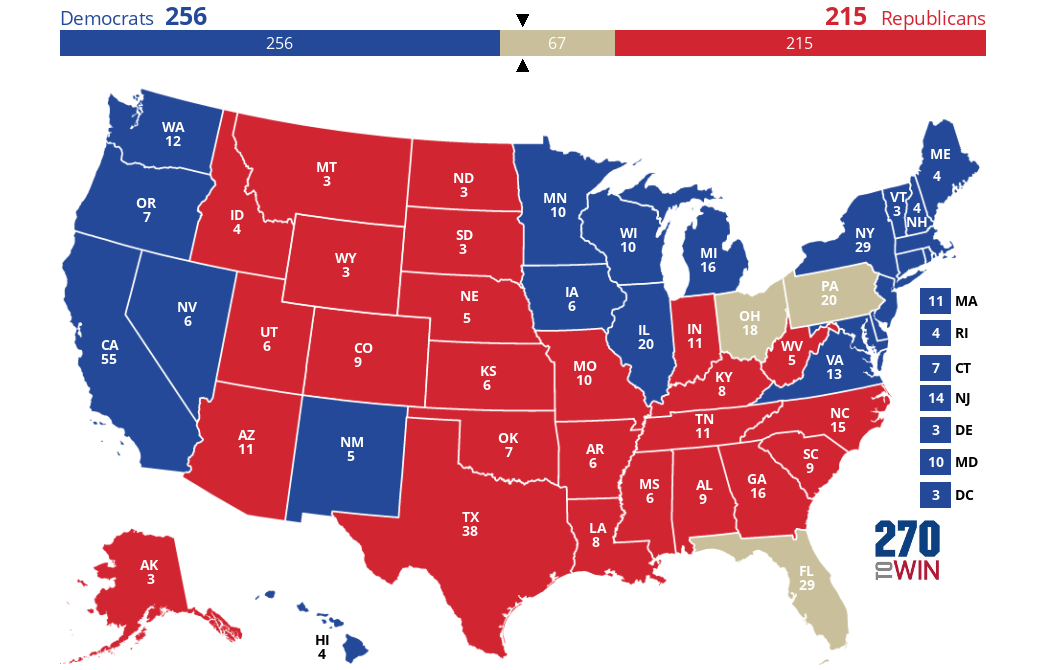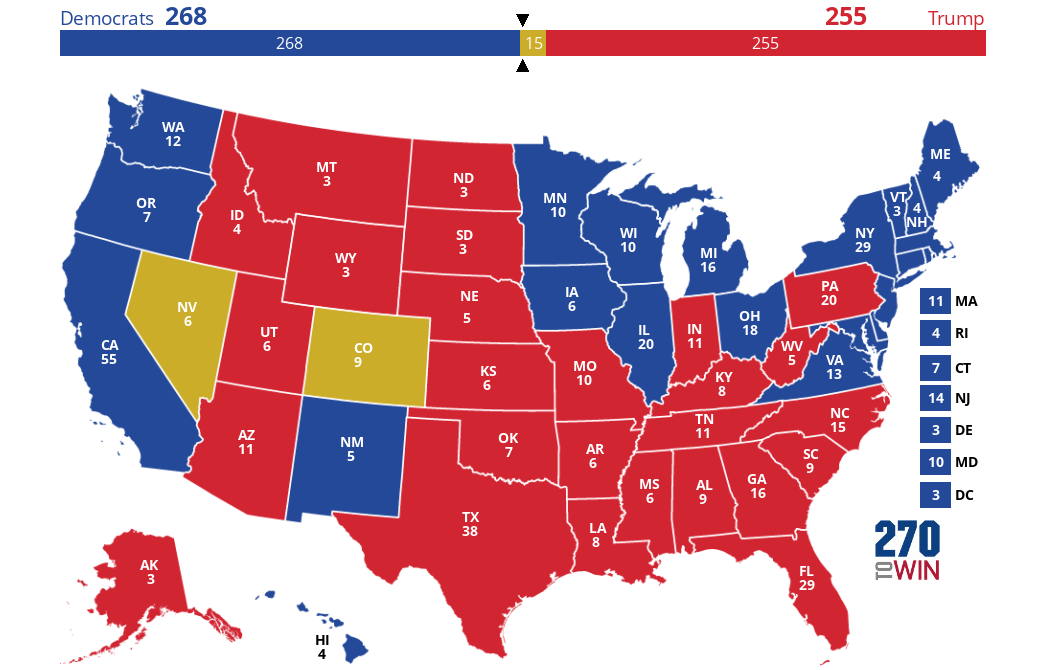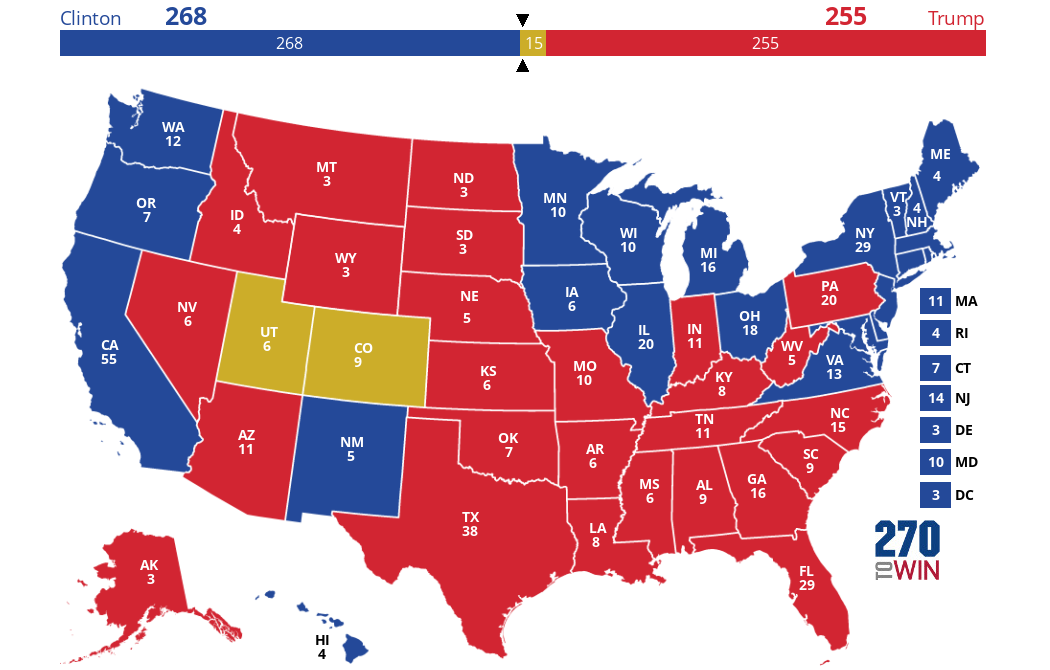Even though it’s already been 2.5 weeks since Cruz and Kasich dropped out (it feels much longer though, doesn’t it??), I’m still in a state of disbelief that Trump actually won the GOP presidential nomination. For me personally, this situation illuminates how much of a bubble I still live in, despite my efforts to look outside of it and understand different perspectives. Clearly there’s still a lot of pain out there driving so many voters into the arms of such an authoritarian candidate who built his platform by playing on fears.
Denial is the first stage of grief, so I figured it would be fun to come up with some House of Cards-esque (admittedly far-fetched) scenarios which would prevent both Trump and Clinton from getting into the White House. Keep in mind that this is fun speculation, a ton of wishful thinking on my part, which evolved into a joke that has actually been kinda therapeutic for me.
Essentially, the only way to deny both Hillary (if she wins the Democratic Party’s nomination) and Trump the presidency is to run an independent GOP slate that can win a handful of states, preventing all candidates from reaching 270 electoral votes. In this situation, the House of Representatives chooses the next president from the top 3 electoral vote getters. Presumably, the GOP-controlled House would pick the independent candidate. Although this situation will definitely not happen (Reince Priebus, the RNC chairman recently called this sort of idea a suicide mission for the country), I’m not alone in my speculation —the New York Times[1] and Observer.com[2] both ran articles with similar ideas, and up until recently, Mitt Romney was actively recruiting a 3rd party candidate to oppose Trump’s presidency[3].
Side Rant: I think it’s foolhardy for people to just assume that Clinton will just waltz into the white house. First, she hasn’t won her party’s nomination yet (woohoo #BernieOrBust). Second, even if she does win the democratic nomination, half of the country has contempt for Hillary embedded in their DNA and will oppose her pretty much no matter what. Third, Trump will only get more free media coverage for bashing her on any of the countless easy targets she gives her detractors—whether all of the claims are founded or not doesn’t really matter in the eye of the public. Lastly, a lot of people in my various bubbles don’t think Trump has a chance to win at all, but I firmly believe that this is dangerous thinking—he’s definitely got a shot, especially if he’s going up against Hillary. Just look at the Electoral College map and you’ll see there are only a couple of states that need to be focused on. The Filipino (and arguably worse) version of Trump showed that demagogues can indeed win and become heads of modern democratic states. Duterte followed a similar trajectory as Trump in that he too was initially seen as a fringe outsider candidate who began gathering support among rural populations and those who felt left behind by economic recovery.
Anyways, with ranting over, my aim is to mix in some data to support some of my ideas (aka cherry picking) but here are some of the assumptions I’ll admit to making:
- Polling data is actually worth something. We’ve seen time and time again that this isn’t necessarily true at all. More on this later.
- Voter turnout during the primaries has no predictive power for general elections. This goes against my gut feelings especially for such a weird election year, but both Politifact[4] and fivethirtyeight[5] have looked at more data than me and have come to this conclusion. As much as it killed some of my potential arguments, I’ll accept this as true because I can’t show otherwise.
- Vice presidential candidates actually can help win votes in their home states. Although some studies conclude the impact of VP candidates to be less than 1%, a recent one in American Politics Research shows that a VP can provide a 2.5% home state boost, which would have been enough to swing 4 elections since 1960[6].
- Spending impacts voters. Yea, I know this is a debatable point, and I’m not saying that more $ spend is an auto-win (history proves this is not the case). I’m just going to roll with the assumption that spending = exposure, get out the vote initiatives, and battering your opponents, all of which taken together makes a difference.
- To simplify things I’m going to assume that the states will generally vote like they did in 2012, with the exception of the battleground states. As a reminder, here is what the 2012 electoral map looked like:
The table below shows the difference between Clinton and Trump and Bernie and Trump respectively in a handful of battleground states. As you can see, Bernie beats Trump more handily in more states AND he has even gained ground in Ohio and Florida during the last two weeks, whereas Clinton has already begun losing ground everywhere. Just sayin ;).
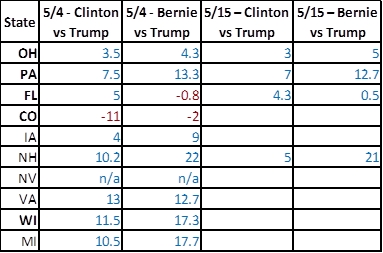
A quick aside about polls—although definitely inexact, the Gallup organization actually uses them to predict the actual popular vote with decent accuracy. I grabbed the data in this table from Wikipedia[7]. The actual result for the past 40 years of elections has been within 6% of what Gallup predicted. Most candidates aren’t able to swing their popularity by more than single digits between the earliest polls taken around April/May and November. The only exceptions to this trend were Bill Clinton and Ronald Reagan, whose big rises are likely due in part because they were newcomers to the national stage. Interestingly though, Obama didn’t have this problem—but I’m not going to dig further right now. The point is that it is pretty hard for most candidates to shift their polling numbers more than 10 points in either direction between now and November, and the polling data actually seems somewhat predictive of the actual popular vote.
Basically, what I’m saying is that given historical trends, Bernie would be a safer candidate for those adamantly against Trump in the white house since he has a bigger buffer in the polls than Hillary. Although the polls right now will change between now and November, they haven’t always changed that much.
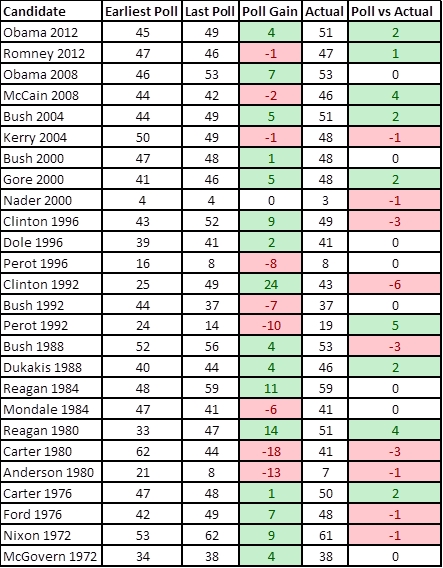
Back from the aside–here’s an electoral map for 2016 with my projected battleground states:
I originally considered a strategy centered on Ohio, Pennsylvania, and Florida, since these states are traditionally known as big swing states. However, I couldn’t come up with a viable slate of candidates that can plausibly pull enough votes from both Hillary and Trump in all 3 states. Kasich carried Ohio (46.8%), had a disappointing showing in neighboring Pennsylvania (19.4% of votes), but didn’t show up at all in Florida (6.8%) where Trump knocked Florida’s native son, Rubio out of the race. I searched through lists of Ohioan and Floridian politicians but sadly couldn’t come up with a better ticket than Kasich/Rubio. Even assuming a generous 2.5% boost for having Rubio as VP, Kasich doesn’t seem to be able to come close. I just don’t see anybody in the field as charismatic as Rubio had the potential to be or anybody with as appealing a resume as Kasich.
Since fiddling around with OH, FL, and PA didn’t work out, I came across the most fantastical electoral map split here[8]:
Instead of the 3rd party candidate going after the highly prized states of FL, OH, and PA directly, they would just need their backers to fund the races in such a way that each of those races tilts a certain way. Given the close competition in those races and the insane amount of money that is going to be spent, I wouldn’t say that OH going to the Democrat and both PA and FL going to Trump are outside the realm of possibility.
(Yes I do know that this particular combination of electoral gamesmanship strategy is pretty flawed because it is super easy to counter by the Democrats. The rule this tries to exploit is the fact that the House can only select from the top 3 electoral vote getters among candidates—meaning the Electoral College delegates from a single state like IL (20) would be enough to force the House Republicans to pick from 2 Democrats and Trump. For fun, and the sake of argument though, let’s just ignore this fact.)
The 3rd party candidate would only need to focus their efforts on winning Nevada and Colorado outright. Targeting NV and CO as a 3rd party candidate actually has a couple of advantages over the more traditional battleground states I considered at first:
- FL and OH in particular are used to being at the center of election politics. There will be a ton of focus on those states as the main candidates wrestle for hearts and minds there. I imagine competition there is ridiculously rough and airtime is probably already bought and paid for. NV and CO have been swing states in the last couple of election cycles, Colorado in particular has seen a huge uptick in spending since 2008, but it typically pales in comparison to more traditional swing states like Florida and Ohio.
The chart below was made from spending data available at www.opensecrets.org:
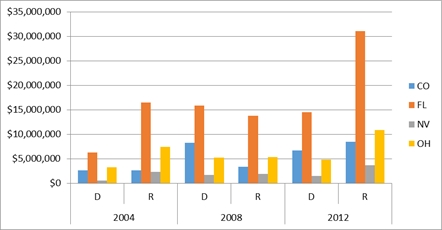 and here are the raw numbers for that chart, in case you’re interested:
and here are the raw numbers for that chart, in case you’re interested:
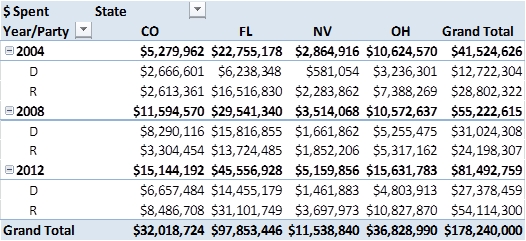
- NV and CO have smaller populations, so it takes fewer people to make a difference than it does in FL, OH, or PA.
- The equation for the 3rd party victory is pretty straight forward: Fewer number of people to sway + less spending competition from rivals = more of the money raised from anti-Trump/anti-Hillary folk available to make sure votes swing the right way in other tight races.
- Both Colorado[9] and Nevada[10] have an even split in terms political affiliation of their elected statewide officials, meaning that both of their populaces are probably somewhat willing to listen to different ideas.
Ok so now you may be wondering who in the world would congressional Republicans be willing to vote in AND is popular enough to draw voters from both parties in Colorado and Nevada? Are you ready??
.
..
…
……
…
..
.
My answer is…. JOHN ELWAY!!!!
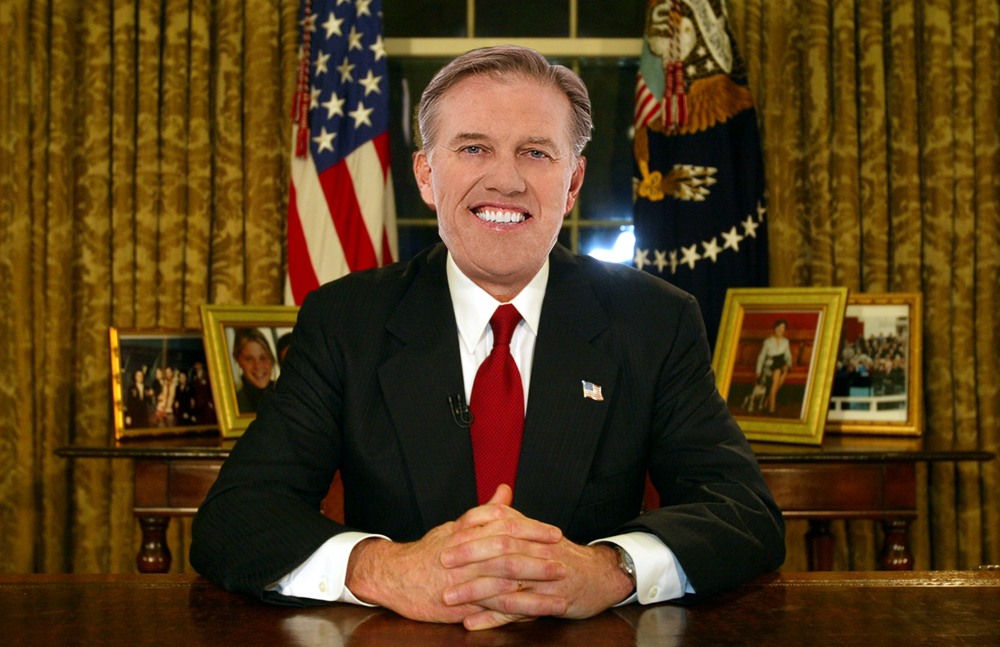
Hahahahahaha. On a theoretical level, I don’t think it’d be the most outlandish of propositions if Elway were somehow convinced to run (not gonna happen). Although…. Sometimes truth is stranger than fiction—this year, Mitt Romney was desperate enough to try and draft Mark Cuban to run against Trump in the general election[11].
Here are a couple of reasons why I think John Elway would actually be a legit candidate to go through with the CO-NV blowup strategy:
- He can win Colorado. First and foremost, the strategy immediately fails if the 3rd partier can’t do so. The man is a legend in the state, especially this year, fresh off the Super Bowl win.
- Elway is an actual Republican[12], and admitted his views are pretty moderate; which should help him pick off voters from both sides.
- He’s got a solid educational background—he studied Econ at Stanford :D.
- Elway obviously has a ton of business acumen. He managed to NEGOTIATE himself out of a bad situation when the Colts took him with the overall #1 pick and got them to CUT A DEAL, trading him to Denver. After football, he netted millions in various business ventures ranging from arena football, to auto dealerships, to restaurants.
- This guy is a PROVEN WINNER. As a Hall of Fame player, he averaged 10.6 wins per season, winning the division 7 times in his 16 seasons. He went to 5 Super Bowls as a player (winning two of them back-to-back), and twice as a GM already.
- Elway’s judgement is sound as displayed by his acumen in judging talent and strategically building his roster[13]:
- The very first draft pick he made as GM (Von Miller) is a Super Bowl MVP. Of the 22 starters on this year’s Super Bowl team, 21 were acquired under Elway’s purview. Basically he took a struggling team, and MADE THE BRONCOS GREAT AGAIN.
- He’s the only GM who, over the past five years, acquired FUTURE Pro Bowlers through pretty much all possible channels: Draft, Free Agency, Unrestricted Free Agency, and Undrafted Free Agency.
- His teams were strong enough to win a playoff game with Tim Tebow (who is not a NFL caliber starting QB) at the helm.
- The Broncos had the best passing offense of all time to the best defense in the NFL over one season.
- Although he’s got a tougher hill to climb in Nevada, but I think his celebrity, moderate stances on issues (we’re extrapolating from what he claims…), record of success in almost everything he touches (unlike Trump), and presumed heavy ad spending would make a victory here plausible.
- In the very worst case, there is an alternative scenario which I think is plausible: Elway gets Utah and helps ensure Trump victory in Nevada instead of Hillary. Utah is a very conservative state, but a lot of Mormans there have moral issues with supporting Trump, making it ripe for Elway’s taking:
So yea, even though this scenario is impossible to about, hopefully I have shown that it would theoretically be possible—if more than a few dominoes happened to fall the right way.
And really, if you had to pick between Elway and Trump for president, can you honestly say that Elway wouldn’t be the better choice? I mean we know very little about his stances on things, but hell, I’ll take the guy who is drama-free, has actual strategy and real successes in multiple businesses over the trainwreck that is Trump.
[1] http://www.nytimes.com/2016/03/03/us/politics/anti-donald-trump-republicans-call-for-a-third-party-option.html?smid=tw-share&_r=2
[2] http://observer.com/2016/03/risky-business-the-unorthodox-way-the-gop-can-stop-donald-trump/
[3] http://www.cnn.com/2016/05/18/politics/mitt-romney-never-trump-independent-2016-campaign/
[4] http://www.politifact.com/punditfact/statements/2016/mar/06/david-brooks/david-brooks-said-primary-turnout-doesnt-predict-g/
[5] http://fivethirtyeight.com/features/primary-turnout-means-nothing-for-the-general-election/
[6] https://www.washingtonpost.com/news/monkey-cage/wp/2016/04/26/this-research-shows-that-vice-presidential-candidates-actually-do-win-votes-in-their-home-states/
[7] https://en.wikipedia.org/wiki/Historical_polling_for_U.S._Presidential_elections
[8] http://www.270towin.com/news/2016/05/07/indulge-your-inner-third-party-with-this-three-way-electoral-map_290.html
[9] http://elections.mytimetovote.com/elected_officials/colorado.html
[10] http://elections.mytimetovote.com/elected_officials/nevada.html
[11] https://www.washingtonpost.com/politics/inside-the-gop-effort-to-draft-an-independent-candidate-to-derail-trump/2016/05/14/1b04682e-1877-11e6-924d-838753295f9a_story.html
[12] http://www.politico.com/blogs/politico-now/2014/02/john-elway-my-beliefs-align-with-gop-182520
[13] http://gazette.com/klee-john-elway-even-better-as-gm-than-quarterback/article/1569985
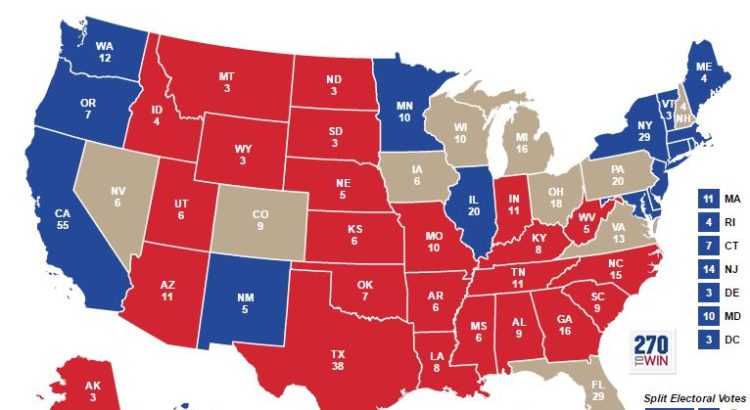

 Click the map to create your own at
Click the map to create your own at 